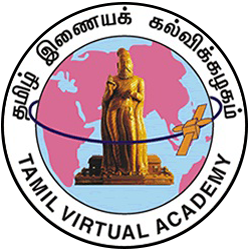Primary tabs
-
Page 4
iii. The part of speech.
1,
The part of speech of a word follows the divisions of English grammar; and it is indicated in italics after its transliterated equivalent.
2.
When words expressive of sounds are treated, they are given as nouns, with the suffix எனல் added e.g., ஒல்லெனல், In illustrative quotation, however, a variant of எனல் may occur.
3.
Where a compound word is made up of a noun and a verb and is related only as subject and predicate, such compound word, if given to indicate idiom is treated as a noun, e.g., வழிமுட்டுதல்,
4.
The verbs undergo various changes of gorm in conjugation1. such changes have been classified, following Dr. Graul, under twelve type-verbs, viz., (1) செய்-, (2) ஆள்-, (3) கொள்-, (4) அறி-, (5) ஆக்கு-, (6) ஈடு-, (7) உண் -, (8) தின்-, (9) கேள்-, (10) கல்-, (11) தீர்-, (12) நட-, The conjugational stems that do not come under these types, like தா-, சா-, காண் -, make a new class (13). The distinctive forms of these type-verbs appear in a separate table. The numeral given after the transliterated form and before the conjugation compound verbs are not indicated in this way, as such verbs follow the conjugation of their final component. For instance, இடிவிழு-தல் does not bear the reference to the number of the typr-verb ; but விழு-தல் does.
5..
When a verb is both transitive and intransitive in use, its origin or cognate, if known, is given immediately after the part of speech, but before its distinctive use, e.g., அ ஊன்று - தல் ‡‹Šர-, 5 v. [T. ‡nu, ‡nnu.] intr. 1.To be fixed...--tr. To fix...
6.
When a word is treated as belonging to several parts of speech its origin or cognate, if known, is given immediately before the part of speech, e.g. சற்று,
Iv. The Origin and Derivation.1.
With regard to the origin of words, there are five points to be noticed :
a.
When the origin of a word is certainly known, the original word of the derivate is preceded by the sign < ;
b.
When the suggested origin is probable, prob. precedes the original word ;
c.
in doubtful cases, perh. precedes the suggested origin ;
d.
Where a possible relation or a mere correspondence is suggested word ;
e.
in cases where no conjecture is possible, nothing is indicated by way of origin.
1 There are certain defective verbs in Tamil as in Sanskrit and certain other languages, and they are they conjugated not in all tenses but in few only. In those cases, only such conjugated forms as are indicated bu the illustrations should be understood as having been given.
Page

HOME

